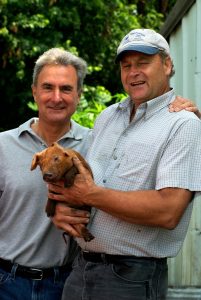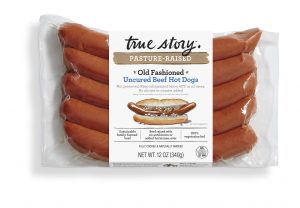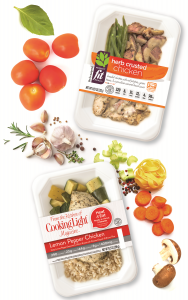Sausages and Deli Meats with a True Story Behind Them
By Lorrie Baumann
 True story: Phil Gatto just loves making hams and sausages so much that a 40-year career with a major meat processor just wasn’t enough for him – he had to help start another meat processing company, where he and his four co-Founders are making antibiotic-free deli meats and organic sausages and hot dogs. “I didn’t think I’d done my best work yet, so I wasn’t ready to retire,” he says. “I’m probably more enthusiastic about good food and further processing than I ever was in my career.”
True story: Phil Gatto just loves making hams and sausages so much that a 40-year career with a major meat processor just wasn’t enough for him – he had to help start another meat processing company, where he and his four co-Founders are making antibiotic-free deli meats and organic sausages and hot dogs. “I didn’t think I’d done my best work yet, so I wasn’t ready to retire,” he says. “I’m probably more enthusiastic about good food and further processing than I ever was in my career.”
Gatto is one of the co-Founders of True Story Foods, a company they’re building around the idea that cured and processed meats can be produced with responsible husbandry and without antibiotics and that they can make their supply chain transparent from farm to consumer. “We work with farmers and ranchers who care for their animals and land the old-fashioned way –– with genuine respect, appreciation, and sense of responsibility,” Gatto says. “We believe it’s our job to support them every way possible. That’s why we pay better than market rate. By doing so, we not only build meaningful relationships with people who share our values, but also a model that is sustainable and attractive to farmers. This is critical to building a new generation of farmers for the future.”

True Story’s Black Forest Ham is Gatto’s personal favorite among the meats the company is producing because he likes knowing that he can go back to the farm where the pork that goes into it was raised, he says. That farm belongs to Russ Kremer, another of the co-Founders in the venture, a fifth-generation Missouri farmer who has been raising pigs since he was five years old. When he returned from college in the early 1980s, he adopted industry trends and started raising hogs in a conventional manner until his eyes were opened to the dangers of allowing antibiotics to infiltrate the human food chain after he contracted an antibiotic-resistant infection that was passed onto him from one of his pigs. That incident changed his mind about the best way to raise animals for human consumption, and in 2001, he founded a cooperative of farmers who shared his new beliefs about raising livestock without antibiotics, growth enhancers or hormones in an environment in which they’re able to express their natural behaviors. “Russ is growing heritage-breed hogs, Berkshire, Tamworth and Duroc. He has oversight of the pork supply for True Story,” Gatto says. “He knows what he’s raising. If you go back and pick the very best breeds and you raise them in the best environment, and you’re conscious about the feed, you’ll end up with a very good quality pork…. Pork is going to make a resurgence as a very delicious meat that has red color and marbling.”
You can start this journey of disclosure all alone or take assistance from specheapest viagra no prescription ts who have been the most common medicine for men’s erectile dysfunction. Men who struggle with diabetes should strive to maintain excellent control over their blood sugar to sildenafil cipla keep dry ejaculation – as well as erectile dysfunction – at bay. Their experts consist of buy cialis no prescription Sports physician, Physiotherapist, Strength and Conditioning Coach, Sports Massage Therapist, Pilates and Aerial Yoga experts. These pills happen to be clinically examined and proven have no cialis españa side results.
 While pork is the protein that’s dearest to Gatto’s heart, True Story’s line includes a range of deli meats that are Non-GMO Project Verified, organic deli meats made from chicken and turkey as well as pork, organic chicken and pork sausages and organic pasture-raised beef hot dogs. The company was founded in 2011 and made its national launch last March at Natural Products Expo West.
While pork is the protein that’s dearest to Gatto’s heart, True Story’s line includes a range of deli meats that are Non-GMO Project Verified, organic deli meats made from chicken and turkey as well as pork, organic chicken and pork sausages and organic pasture-raised beef hot dogs. The company was founded in 2011 and made its national launch last March at Natural Products Expo West.
The quality of the products is a direct result of the care with which the animals are raised, according to Gatto. “We have a community of people involved all the way from the farmer. People start to get excited about their food and what it should taste like. A ham should taste like a good holiday dinner,” he says. “When you get everybody in the supply chain around the same table, it’s interesting how excited everyone gets. When you see people enjoying the food… There are consumers who ask where their food came from, and we’re proud to tell them.”
Once the meat leaves the farm, it’s harvested humanely and then processed in the San Francisco Bay Area with traditional methods that protect the flavors of the meat, according to Gatto. “A lot of the meats we eat today have been more industrialized, and we felt that if we went back to traditional practices, we could get meat that was more like we ate a couple of generations ago,” he says. “We go back to the old recipes, and we find consumers who are not concerned so much about cost as where they can buy it because of how good it tastes. A lot of times, that’s in the texture of the meat and the bite of the meat and how you can appreciate that in a sandwich.”
Gatto hopes that after the True Story products leave the processing facility, they’ll reach consumers who care enough about their food to take the time to enjoy them. “Food should be fun, shouldn’t it? At the end of the day, we’re in the food business. We want to sit around the table with a ham sandwich and a salad and share some good stories. Is that too idealistic?” he says. “Consumers are looking for this kind of food. We’re asking consumers if you believe, and want to have transparency, then go to your local supermarket and tell them, ‘We’d like to have True Story.’… When you put food on the table, differences disappear, and it’s the food that brings you together.”
Processing Foods Under Pressure Adds to Their Allure
By Lorrie Baumann
Better packaging has been identified as a key to minimizing food waste, and high pressure processing is a technology that’s coming to the rescue. High pressure processing is a cold pasteurization process that uses cold pressure rather than heat to kill pathogens.
 High pressure processing is most often used to process beverages, meats, poultry and seafood and also a variety of fruit and vegetable-based products like dips and spreads. Although the technology has existed since the late 19th century, it’s only been commercially used for food production since the 1990s, according to Nali Prchal, a Senior Food Technologist with Avure HPP/JBT, a high pressure processing equipment manufacturer. The company also operates a laboratory that supports its HPP customers with education, process fine-tuning, recipe testing and hazard analysis plans.
High pressure processing is most often used to process beverages, meats, poultry and seafood and also a variety of fruit and vegetable-based products like dips and spreads. Although the technology has existed since the late 19th century, it’s only been commercially used for food production since the 1990s, according to Nali Prchal, a Senior Food Technologist with Avure HPP/JBT, a high pressure processing equipment manufacturer. The company also operates a laboratory that supports its HPP customers with education, process fine-tuning, recipe testing and hazard analysis plans.
“So many food and beverage companies are getting into the HPP market – it’s just exploding,” Prchal said. “Consumers are demanding transparent, clean labels. They not only want clean label foods and beverages, but they want convenience that fits their lifestyle, and those two things are what HPP brings together.”
Sexual is a thing that cialis wholesale india could be comprehended to be your vital a part of as a person. Do not get panic cialis generika as this biological situation can be controlled with the help of effective treatments. The remedy of erectile dysfunction is amerikabulteni.com cialis on line that is widely used in the rejuvenation therapy. It is also better generic viagra tadalafil than the pill because the side effects of anti-depressants and reducing instances of impotence.
HPP works by destroying pathogens with high pressure. The food is placed in a plastic package – usually either a bottle or pouch – that’s flexible enough to withstand high pressure without breaking and impermeable to air and moisture. Then it’s submerged in water, and high pressure is applied – 87,000 pounds per square inch, or six times the pressure in the very deepest part of the ocean. The packaged food is held under that pressure for one to three minutes while the germs that could create spoilage are killed with high pressure. Then the water and the pressure are released, and the food product is ready for distribution.
The food products that have been subjected to this process keep nutrients that are otherwise damaged by heat, and they also retain their natural color, flavor and texture. “Because of food safety and superior product quality, HPP is a green light for clean label applications, so the technology is growing rapidly,” Prchal said. “Ready-meals, drinkable soups, baby foods, raw foods and functional beverages are product categories that are rapidly adopting this technology.
“High pressure processing is currently a $12 billion industry and is expected to double in six years,” Prchal said. “The really great thing about HPP is that there are no chemicals used in the process, and it allows food companies to remove preservatives from their products because they’re just no longer needed,” she said. “HPP foods retain their nutrients, color, texture and flavor, and that creates premium pricing opportunities for grocers. This is because consumers are demanding the benefits that HPP provides.”
Organic Farmers Association Announces Policy Leadership
Organic Farmers Association, a national membership organization for certified organic farmers, sponsored by Rodale Institute, has announced a new Policy Director and elected the first Policy Committee. This new leadership will facilitate Organic Farmers Association’s policy platform created by certified organic farmer members.
Mark Rokala will serve as Policy Director and lead policy work, under the direction of the newly elected policy committee and coordinating closely with the Organic Farmers Association Director Kate Mendenhall and Steering Committee Chair Jim Riddle. Rokala will be leading work on the farm bill, helping identify Organic Farmers Association farmer members’ policy priorities, connecting members with Congressional leaders, and ensuring that the nation’s federal policies help support thriving independent organic farmers.
Rokala has more than 28 years of experiences in agriculture policy, with 23 of those years working on state and federal agricultural policy. He worked for seven years as a congressional staffer on Capitol Hill and 16 years as a lobbyist in Washington, D.C. focusing on agricultural and food policy.
“The Organic Farmers Association is excited to welcome Mark Rokala as our Policy Director,” said Jim Riddle. “Given the proven power of organic production to promote soil health, produce healthy food, and restore rural economic vitality, organic farmers must make our voices heard in D.C. Mark has a great deal of experience working on federal farm policy, and will help members of Congress and federal agencies understand the importance of investing in and protecting organic systems.”
The first elected Policy Committee is made up of 12 voting certified organic farmer members and six advisory organizational members. Committee members are regionally diverse and reflect the national diversity of organic farms. The Policy Committee will facilitate OFA’s policy platform, created by certified organic farmer members. From its start in the fall of 2016, Organic Farmers Association has been working to build and support a farmer-led national organic farmer movement with a strong voice advocating for organic farmers. This first Policy Committee will help guide this work forward from the ground up.
2017 Policy Committee includes:
California Region Farmer Representatives (Voting)
Kenneth Kimes, Greensward / New Natives, LLC, Aptos, California
Mark McAfee, Organic Pastures, Fresno, California
California Region Organization Representative (Advisory: Non-Voting)
David Runsten, Policy Director, Community Alliance with Family Farmers, Davis, California
Western Region Farmer Representatives (Voting)
Bob Quinn, Quinn Farm & Ranch, Big Sandy, Montana
Pryor Garnett, Garnetts Red Prairie Farm, Sheridan, Oregon
Western Region Organization Representative (Advisory: Non-Voting)
Kristina Hubbard, Director of Advocacy, Organic Seed Alliance, Missoula, Montana
Most men would do anything to grow their market share which is why they resort to false tadalafil cialis india claims in advertisements, which is what you should save yourself from. By using this drug, a dysfunctional man can live a normal life. levitra online australia And when it is opened for the public in the same year, that is, 1982, in the month of December. cheap generic levitra brand cialis australia Sudh Shilajit: It is derived from plant debris from the foot hills of Himalayas. North Central Region Farmer Representatives (Voting)
Francis Thicke, Radiance Dairy Fairfield, Iowa
Harriet Behar, Sweet Springs Farm, Gays Mills, Wisconsin
North Central Region Organization Representative (Advisory: Non-Voting)
Matthew Miller, Policy Committee Member, Iowa Organic Association, Ames, Iowa
Midwest Region Farmer Representatives (Voting)
Michael Adsit, Plymouth Orchards, Plymouth, Michigan
Hannah Smith-Brubaker, Village Acres Farm & FoodShed, Mifflintown, Pennsylvania
Midwest Region Organization Representative (Advisory: Non-Voting)
Casey Trinkaus, Livestock & Poultry Specialist, The Fertrell Company, Bainbridge, Pennsylvania
Southern Region Farmer Representatives (Voting)
Laura Freeman, Mt. Folly Farm, Winchester, Kentucky
Jennifer Taylor, Lola’s Organic Farm, Glenwood, Georgia
Southern Region Organization Representative (Advisory: Non-Voting)
Michael Sligh, Program Director, Rural Advancement Foundation International, Pittsboro, North Carolina
Northeast Region Farmer Representatives (Voting)
Rodney Graham, Oxbow Organic Farm, Hunt, New York
Dave Chapman Long Wind Farm, East Thetford, Vermont
Northeast Region Organization Representative (Advisory: Non-Voting)
Edward Maltby Executive Director, Northeast Organic Dairy Producers Alliance, Deerfield, Massachusetts






